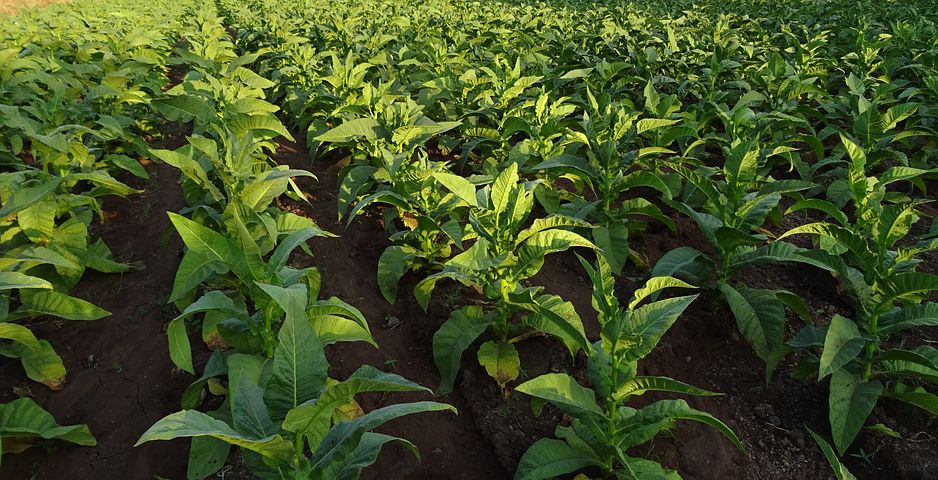
Tobacco’s Hidden Children: Hazardous Child Labor in United States Tobacco Farming
Children working on tobacco farms in the United States are exposed to nicotine, toxic pesticides, and other dangers. Child tobacco workers often labor 50 or 60 hours a week in extreme heat, use dangerous tools and machinery, lift heavy loads, and climb into the rafters of barns several stories tall, risking serious injuries and falls. The tobacco grown on US farms is purchased by the largest tobacco companies in the world.
Ninety percent of tobacco grown in the US is cultivated in four states: North Carolina, Kentucky, Tennessee, and Virginia. Between May and October 2013, Human Rights Watch interviewed 141 child tobacco workers, ages 7 to 17, who worked in these states in 2012 or 2013. Nearly three-quarters of the children interviewed by Human Rights Watch reported the sudden onset of serious symptoms—including nausea, vomiting, loss of appetite, headaches, dizziness, skin rashes, difficulty breathing, and irritation to their eyes and mouths—while working in fields of tobacco plants and in barns with dried tobacco leaves and tobacco dust. Many of these symptoms are consistent with acute nicotine poisoning.
Based on our findings set out in this report, Human Rights Watch believes that no child under age 18 should be permitted to perform work in which they come into direct contact with tobacco in any form, including plants of any size or dried tobacco leaves, due to the inherent health risks posed by nicotine and the pesticides applied to the crop. The US government, US Congress, and tobacco manufacturing and tobacco leaf supply companies should all take urgent steps to progressively remove children from such tasks in tobacco farming.
In the US, it is illegal for children under 18 to buy cigarettes or other tobacco products. However, US law fails to recognize the risks to children of working in tobacco farming. It also does not provide the same protections to children working in agriculture as it does to children working in all other sectors. In agriculture, children as young as 12 can legally work for hire for unlimited hours outside of school on a tobacco farm of any size with parental permission, and employers may hire children younger than 12 to work on small farms with written parental consent. Outside of agriculture, the employment of children under 14 is prohibited, and even 14 and 15-year-olds can only work in certain jobs for a limited number of hours each day.
Tobacco farmed in the US enters the supply chains of at least eight major manufacturers of tobacco products who either purchase tobacco through direct contracts with tobacco growers or through tobacco leaf supply companies. These include Altria Group, British American Tobacco, China National Tobacco, Imperial Tobacco Group, Japan Tobacco Group, Lorillard, Philip Morris International, and Reynolds American. Some of these companies manufacture the most popular brands of cigarettes sold in the US, including Marlboro, Newport, Camel, and Pall Mall. All companies that purchase tobacco in the US directly or indirectly have responsibilities to ensure protection of children from hazardous labor, including on tobacco farms, in their supply chains in the US and globally.
Child tobacco workers interviewed by Human Rights Watch for this report typically described beginning to work on tobacco farms at age 13, often together with their parents and older siblings. Only very few worked on family farms. The children we interviewed were mostly the sons and daughters of Hispanic immigrants, though they themselves were frequently US citizens. Regardless of employment or immigration status, the children described working in tobacco to help support their families’ basic needs or to buy essential items such as clothing, shoes, and school supplies. For example, 15-year-old Grace S. told Human Rights Watch why she decided to start working in tobacco farming in North Carolina: “I just wanted to help out my mom, help her with the money.”
Most children interviewed by Human Rights Watch were seasonal workers who resided in states where tobacco was grown and worked on farms near their homes or in neighboring areas, primarily or exclusively during the summer months when tobacco is cultivated. We also spoke to several children who migrated to and within the United States by themselves or with their families to work in tobacco and other crops. There is no comprehensive estimate of the number of child farmworkers in the US.
Tobacco is a labor-intensive crop, and the children interviewed described participating in a range of tasks, including: planting seedlings, weeding, “topping” tobacco to remove flowers, removing nuisance leaves (called “suckers”), applying pesticides, harvesting tobacco leaves by hand or with machines, cutting tobacco plants with “tobacco knives” and loading them onto wooden sticks with sharp metal points, lifting sticks with several tobacco plants, hanging up and taking down sticks with tobacco plants in curing barns, and stripping and sorting dried tobacco leaves.
Read more here.
